Natural Calamity Cess: GST Council constitutes GoM to Assess State Revenue Mobilization Policies
The proposals for a Natural Calamity Cess were raised in recent times by Andhra Pradesh and Kerala who sought conducive Governmental Policies for rehabilitation following ravaging climate disasters

The Goods and Service Tax (GST) Council has constituted a Group of Ministers (GoM) to assess and formulate revenue mobilization policies through the imposition of a natural calamity cess by states that have been ravaged by natural disasters.
The GoM shall be chaired by Uttar Pradesh Finance Minister Suresh Kumar Khanna and membered by the following finance ministers - Ajanta Neog of Assam, O P Choudhary of Chhattisgarh, Kanubhai Desai of Gujarat, K N Balagopal of Kerala, Premchand Aggarwal of Uttarakhand, and Chandrima Bhattacharya of West Bengal.
Read More: A Glimpse of COP29: Carbon Taxes, Climate Finance and a Trillion Dollars
The idea of a natural calamity cess was brought back into discussion after Andhra Pradesh and Kerala sought additional revenue sources to finance disaster relief. In the GST Council meeting held in December 2024, Andhra Pradesh Finance Minister Payyavula Keshav proposed a 1% calamity cess on luxury goods consumed in the state. The revenue generated would be used to support rehabilitation efforts after the floods that hit Andhra Pradesh in September-October 2024.
A similar precedent was set in 2018, when Kerala requested additional funds following the devastating floods that ravaged parts of the Idukki, Wayanad, Ernakulam, Alappuzha, Kottayam, Pathanamthitta, and Thrissur districts. The GST Council had then approved a 1% calamity cess for Kerala in January 2019, allowing the state to impose the levy for two years on select goods and services.
Read More: India to Puff Up GST on Cigarettes and Tobacco Products once Compensation Cess is Removed
The GoM will assess the legal and constitutional feasibility of states imposing a calamity cess under the GST framework. It will determine whether the levy should be sector-specific (e.g., luxury goods) or broad-based, and whether it should apply to B2B, B2C, or both transactions. Additionally, the GoM shall establish a standardized definition of 'natural calamity' for cess eligibility and explore alternative fiscal mechanisms to help states manage disaster-related revenue shortfalls without altering the existent GST structure.
The GoM shall submit a recommendation to the GST Council on the basis of its studies and research reports, following which the GST Council shall take a call on whether a uniform natural calamity cess policy shall be implemented across states.
Read More: 55th GST Council Meeting: Key Highlights
With increasing effects of pollution, over-population and environmental hazards taking an immense toll on the quality of life of citizens, the Government should expedite revenue allocation and climate control policies to steer the way ahead.
Support our journalism by subscribing to Taxscan premium. Follow us on Telegram for quick updates


